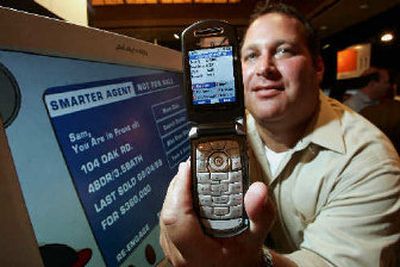Talk of the show

HUNTINGTON BEACH, Calif. — We have more ways than ever of communicating, but trying to keep up with family and friends can be exasperating.
Our overlapping free time seems to shrink. We constantly play phone and voice mail tag. And e-mail, in its tone-deaf impersonality, barely helps.
One of the most unorthodox and intriguing among 32 new products launched onstage at this week’s DEMOfall conference, a showcase of tech innovation, was a Web-based tool with a mission: to encourage emotional connection via audio messages.
Not two-way conversations, mind you. Just me telling you my news. Click, talk and send.
The product is called YackPack because the user creates groups, or packs, of people who can be audio-messaged individually or collectively. Each member of your pack gets an icon with his or her picture on it. An e-mail notification tells you when a Yack has arrived.
“It turns out that asynchronous audio is the secret sauce for what keeps relationships alive and fresh,” said B.J. Fogg, the company founder and chief executive. Much of YackPack’s recipe came from the year Fogg spent with a focus group of women over age 50.
Unlike Fogg, the typical tech startup CEO will bend your ear with metrics on market potential while spouting technobabble that would befuddle all but us geeks.
Such people abounded at DEMOfall, where other promising products pitched to an elite crowd of investors and press also sought to better manage relationships: by turning a cell phone into a conference-call manager, helping eBay users place bids wirelessly, protecting the privacy of online consumers.
Fogg, on the other hand, was more apt to be accused of psycho-babble. He is, after all, a Stanford psychologist in addition to being a computer scientist.
“We’re helping people connect emotionally, and that leads to happiness,” he said.
Santa Rosa, Calif.-based YackPack goes live in mid-October and will be free while in beta, then cost well under $10 per month, with a free ad-based version, Fogg says.
There’s no software to download, and Fogg says YackPack even works with dial-up connections. All you need is to get a microphone working with your computer.
“Three-year-olds can do it. Grandmas can do it. People who can’t read and write can do it,” said Fogg.
He sees the product as benefiting circles well beyond families — cancer support groups, for example.
DEMO’s semiannual shows have been springboards for such industry standouts as TiVo, the Palm Pilot and the Danger HipTop. After six years under the DEMOmobile moniker, this year’s fall show got a name change in recognition of our ability to finally go online wirelessly with increasing ease.
DEMO show producer Chris Shipley says the legions of ultra-productive but also constantly reachable and thus often harried “always-on people” are driving today’s tech market. Shipley calls it the dawning era of “ultrapersonal computing.”
Software and services thus dominated DEMOfall, with a number of products appearing poised to humble industry giants, especially in telecommunications.
One was Mobile Call Manager from Menlo Park, Calif.-based TalkPlus Inc., which uses Internet phone technology over the traditional cellular network. It makes cheap calls available on cell phones while adding such features as the ability to have multiple phone numbers ring on a single handset and on-the-fly conference calling with up to 10 participants.
That’s something no wireless carrier now offers.
CEO Jeff Black claims he’ll be able to offer low, low rates — 2 cents a minute for calls within the United States and Canada — and he’s lining up multiple carriers internationally for a Jan. 1 launch. He wouldn’t name the partners.
Jingle Networks Inc. of San Francisco sees directory assistance as another huge market — worth an estimated $8 billion a year in the United States — that’s ripe for the plucking.
To bypass the traditional carriers, Jingle connects callers for free to the business, government office or residence of their choice. The trade-off for using 1-800-FREE-411: Callers must first listen to a 12-second recorded pitch.
Jingle’s success will depend on its ability to sign up local merchants. When I called the service to get my home phone number, the pitch I heard, after following the voice prompts, was for Jingle itself.
The cell phone is also the key for Camden, N.J.-based Smarter Agent Inc. Its first service delivers real estate listings to mobile handsets based on a user’s location.
If you like a neighborhood but are nowhere near a computer, just use the map on your cell phone screen to see what nearby houses are on the market, the asking price and other details. You can even search to see recent selling prices for comparable homes in the neighborhood.
Smarter Agent, a registered Realtor, draws on the Multiple Listing Service used by agents across the nation on their Web sites. It is far from nationwide yet and currently requires Verizon Wireless service. If you’re in selected markets in California and Florida or live in the Philadelphia area, you can check it out. It’s free.
Safeguarding privacy online has become an ever more serious concern with identity theft a mounting problem. That was reason enough for a company called UniPrivacy Inc. to build a business on protecting consumers proactively.
The company’s newly launched DeleteNow product will, for $2.99 per month, remove information about you from more than 100 online sources — search engines and databases including Google Inc. — and check those sites daily to make sure the information stays off.
However, plenty of sites that might contain personal information about you, such as Claria Corp., aren’t cooperating, says chief executive Chaz Berman.